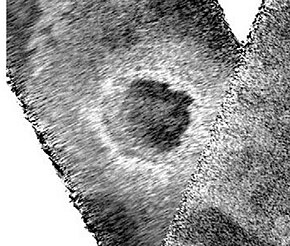Selk is a crater on Titan, a moon of Saturn, located at 7°N 199°W. It is a geologically young impact crater that measures approximately 90 kilometres (56 mi) in diameter.[1]
 A radar image of Selk by the Cassini probe | |
| Feature type | Impact crater |
|---|---|
| Location | Titan |
| Coordinates | 7°00′N 199°00′W / 7.0°N 199.0°W |
| Diameter | 90 km |
| Discoverer | Cassini |
| Eponym | Serket |
There is evidence of the past presence of organic compounds and liquid water in the crater, which is set to be studied in the planned Dragonfly mission.[2] The initial landing site will be in the dunes to the Southeast of Selk.[3]
The crater is named after Serket, a goddess in Egyptian mythology, and was formally approved by the IAU in 2008.[4]
References
edit- ^ "Geology of the Selk crater region on Titan from Cassini VIMS observations." J.M. Soderblom, R.H. Brown, L.A. Soderblom, J.W. Barnes, R. Jaumann, Stéphane Le Mouélic, Christophe Sotin, K. Stephan, K.H. Baines, B.J. Buratti, R.N. Clark, and P.D. Nicholson. Icarus. Volume 208, Issue 2, August 2010, Pages 905-912. doi:10.1016/j.icarus.2010.03.001
- ^ Hautaluoma, Grey; Johnson, Alana (27 June 2019). "NASA's Dragonfly Will Fly Around Titan Looking for Origins, Signs of Life" (Press release). NASA. Retrieved 2019-08-16.
- ^ Lorenz, Ralph D.; MacKenzie, Shannon M.; Neish, Catherine D.; Gall, Alice Le; Turtle, Elizabeth P.; Barnes, Jason W.; Trainer, Melissa G.; Werynski, Alyssa; Hedgepeth, Joshua; Karkoschka, Erich (2021). "Selection and Characteristics of the Dragonfly Landing Site near Selk Crater, Titan". The Planetary Science Journal. 2 (1): 24. Bibcode:2021PSJ.....2...24L. doi:10.3847/PSJ/abd08f. S2CID 233934724.
- ^ "Selk". Gazetteer of Planetary Nomenclature. International Astronomical Union (IAU) Working Group for Planetary System Nomenclature (WGPSN). Retrieved 15 August 2019.